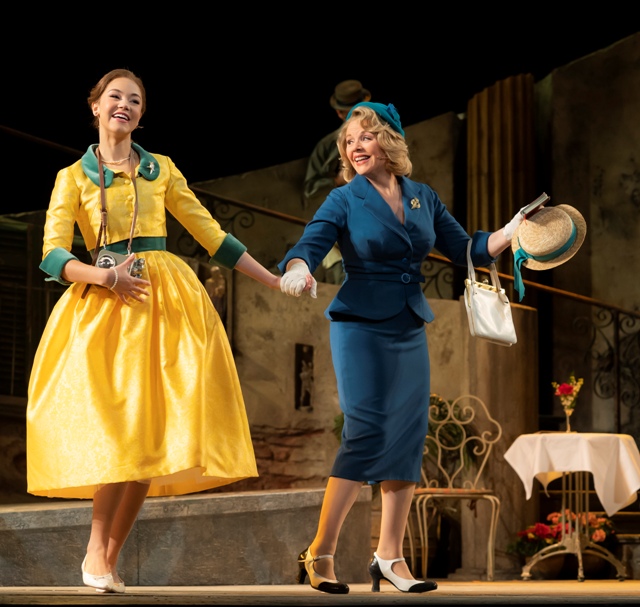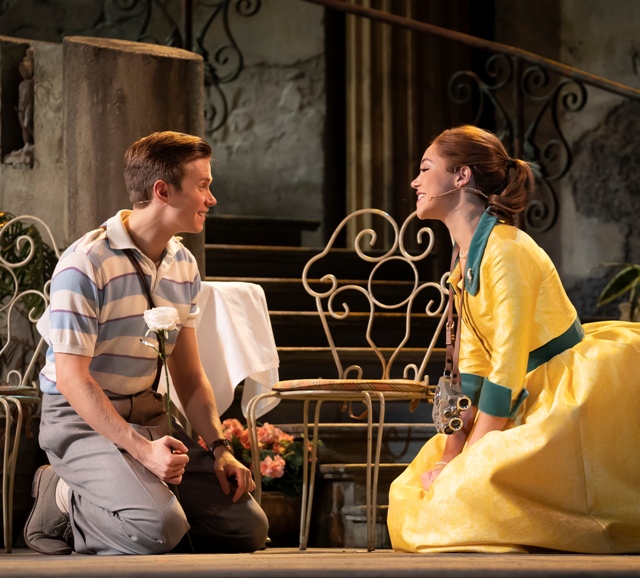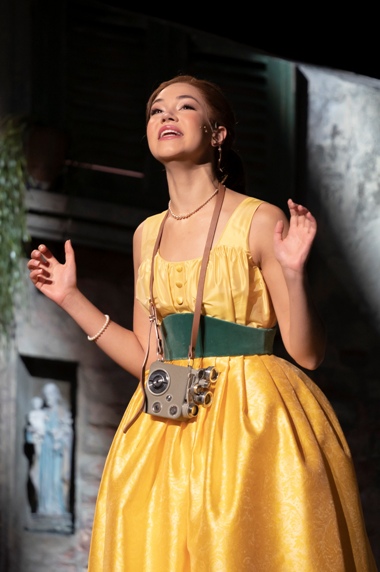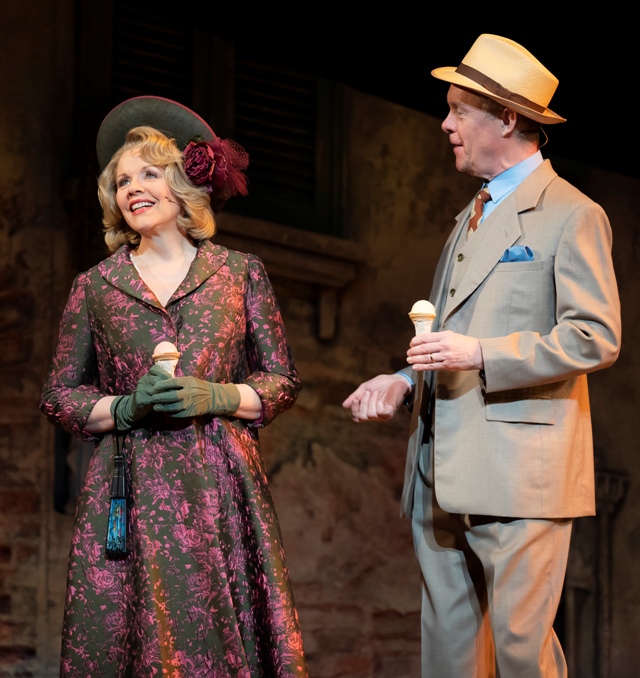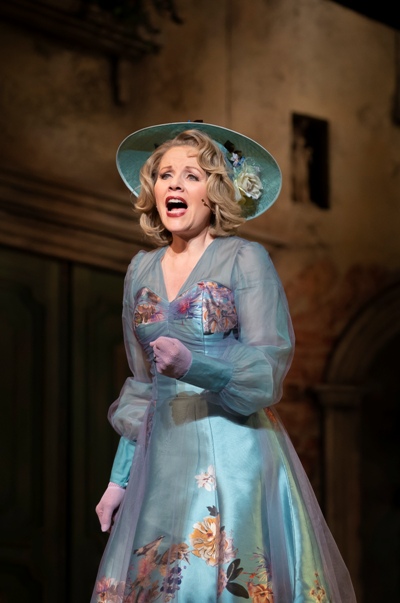Renée Fleming brings glowing voice to a mom shielding her daughter in ‘Light in the Piazza’
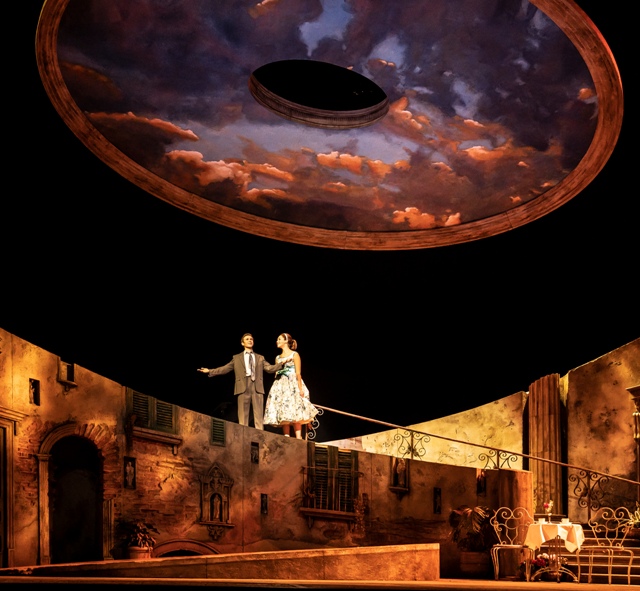
Rob Houchen and Solea Pfeiffer play young lovers instantly smitten in a touring production of ‘The Light in the Piazza.’ The show goes to Sydney in 2020. (Photos throughout by Liz Lauren)
Review: “The Light in the Piazza,” musical by Adam Guettel and Craig Lucas, on tour at Lyric Opera House thru Dec. 29. ★★★
By Nancy Malitz
As she stood near the lip of the Lyric Opera of Chicago stage where she has sung so many great roles, the soprano Renée Fleming delivered a luscious mixture of love, acquiescence and regret in an aria called “Fable” that put me instantly in mind of a noble lady she played onstage for years – the Marschallin in Richard Strauss’ “Der Rosenkavalier,” who realizes that her fond affair with a much younger lover has come to its inevitable end.
“Fable” is a similar, achingly beautiful scene, mixing love and regret in tender measure. It serves as the finale of the 2005 Tony Award winning musical “The Light in the Piazza,” which is a tenant at the Lyric Opera House for a few weeks, the better to showcase this new London-based production starring Fleming. It has already toured to Los Angeles and will continue on to Sydney in 2020.
The romantic story, set in the ’50s, is based on a 1960 novella by Elizabeth Spencer about a South Carolina woman, Margaret Johnson, on holiday in the sun-drenched city of Florence with her unusually childlike adult daughter, Clara, to whose care Margaret is singularly devoted. (The story was turned into a movie starring Olivia de Havilland, Yvette Mimieux as the daughter, and George Hamilton as Fabrizio, in 1962, and it was workshopped at the Goodman Theatre back in 2004 on its way to Broadway.)
When Clara falls in love at first sight with the young Italian stranger Fabrizio, the crashing certainty of the naive girl’s determination to wed triggers not only Margaret’s protective alarm, but also her fear of an empty future in her own marriage gone cold. And while “The Light in the Piazza” meanders into caricature and sometimes confuses, it’s hard to argue with the seriousness of the producers’ ambitions, Fleming’s touching portrait, an adept cast, and the rewarding Lyric Opera Orchestra under Kimberly Grigsby, who turned out the music’s rather quirky, chromatic wanderings as if neo-romanticism was just invented yesterday.
Now 60, Fleming has exited many of her mainstage opera roles, but she has remained vibrant as a theatrical performer and recording artist, lending her clout and enthusiasm to works based on iconic characters such as Tennessee Williams’ Blanche DuBois and Odysseus’ long-suffering wife Penelope, the artist Georgia O’Keefe and Marilyn Monroe. In Chicago, Fleming has been transformative as creative consultant to Lyric Opera; high on any list of achievements was her help in convincing the Rodgers and Hammerstein estate to give Lyric Opera permission to present its most iconic musicals, expanding the company’s theatrical purview.
The relationship continues. Fleming has starred in Rodgers and Hammerstein’s “Carousel” on Broadway. And as it happens, the music of “The Light in the Piazza” was composed by Adam Guettel, Rodgers’ grandson. (The script is by Craig Lucas, who also adapted the movie “An American in Paris” into a Broadway musical.)
The story opens on a ramped, semi-circular set (designed by Robert Jones) depicting the Florentine gathering spot of the title. Margaret has her nose in a guidebook, reading in her soft southern accent about Leonardo and “Michael”-angelo. These are names that Clara (Solea Pfeiffer, in a pleasant role debut) absent-mindedly parrots until she is suddenly stopped in her tracks: “That’s a completely naked statue!” and the two go on a bit about this “new old world” before innocent Clara launches into the equivalent of her “Something’s coming” number. She notes that she “feels grown” even as it’s apparent that she isn’t, quite. She and Fabrizio (Rob Houchen, with a knockout tenor voice) meet when her hat falls into his hands, and the two are instantly smitten.
Already at this early point in the Lyric Opera House, it was apparent that even though the show is in English, it sure could have used surtitles. The grand interior with thousands of reflective surfaces is a rich resonating chamber designed for sustained sound and long, long decay. As paradoxical as it may seem, the only scene with talking that made crystal clear sense to the ear, at least in the part of the audience where I sat, was a charmingly wild Italian segment: Fabrizio, the young Italian who’s head-over-heels, bursts in upon his family screaming for help in frantic staccato exclamations, because he thinks he’s lost the girl he just met. The meaning of his chatter was obvious to everyone, I’m sure: “Clara! Aiutami, aiutami! Son perduto! Oh, Signore! L’ho perduta, il mi’amor!” And yet this is the only scene where Fabrizio’s mother steps forward, out of character, to tell everybody in English what’s going on.
Even as other actors in the cast lost some of their best lines to the sonic fog, however, Fleming came through clear as a bell. And top to toe, she looked the essence of a ladylike housewife of the fifties – the trim suit and flowered bouffant dresses, the hats, the purses, the pumps (so-right costumes by Brigitte Reiffenstuel). But Margaret’s substance and secrets are revealed in numbers that are really like operatic scenes, and doubtless because Fleming knows that Lyric Opera stage intimately, including exactly where to stand and how best to sing and speak to be understood, her soaring musical soliloquies succeeded best.
Fleming’s sad recounting of that brief instant when Margaret looked away, and something happened to her daughter at the age of twelve that desperately imperiled her destiny, began in a quietly spoken voice and soared to a level of tension and sorrow that seemed sustained by the spellbound house. And Margaret’s scene of reflection upon a marriage that had long before had its “dividing day” was sophisticated in its essence and operatic in every way, reflecting the best blend of Guettel’s music and Lucas’s poetry.
Elsewhere the show had more Hallmark simplicity than edge in it. Alex Jennings (who was the Duke of Windsor in Netflix’s “The Crown”) was so elegant as Fabrizio’s father, Signor Naccarelli, that one had no trouble believing that he and Fleming’s Margaret could come to a meeting of the minds over an impossible situation just by taking a stroll. The young lyric tenor Rob Houchen, in his impressive debut as Fabrizio, was the classic charmer with broken English who always gets the girl: “Now is I am happiness, Never I am unhappiness, Now is I am happiness with you.”
Fabrizio’s brother Giuseppe (Eric Sciotto) knows he’s beautiful and has a wandering eye to prove it, but Giuseppe’s wife Franca (Suzanne Kantorski) has his number and then some. Just watching Sciotto get up out of a chair tells you he can dance, and Kantorski’s got enough edge to do stand-up. Neither has all that much to do in this show but Franca’s saltiness was welcome. Maybe along with the properly cynical Signora of this Italian household (Marie McLaughlin), a believer in good old guilt, they could spin off a sitcom.
Related Links:
- Performance location, dates and times: Details at TheatreInChicago.com

